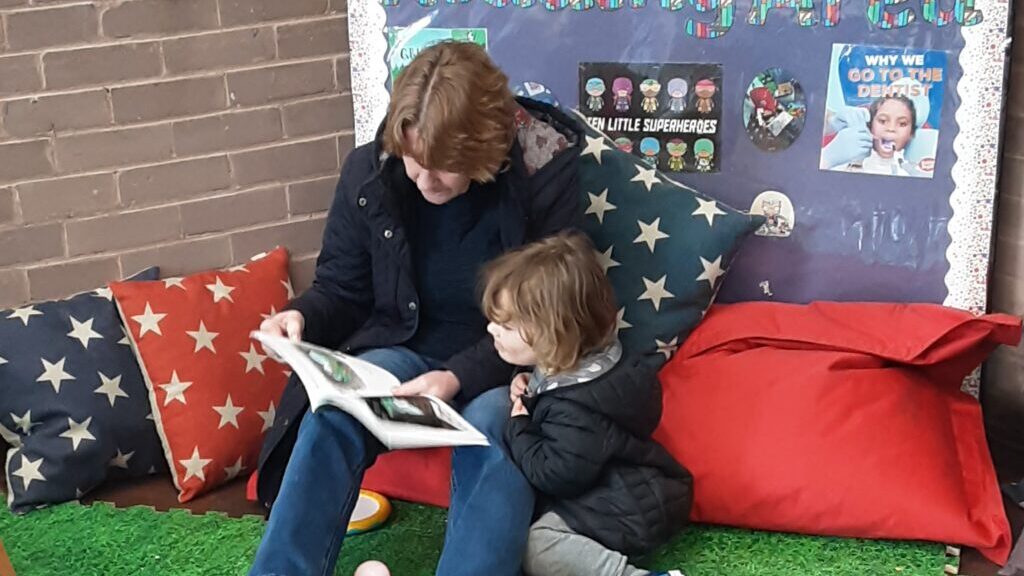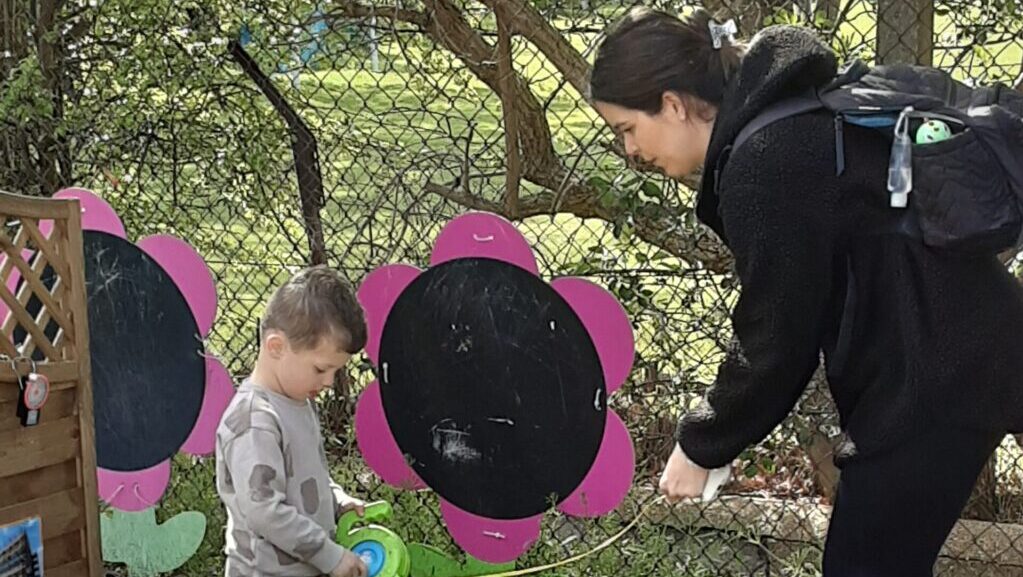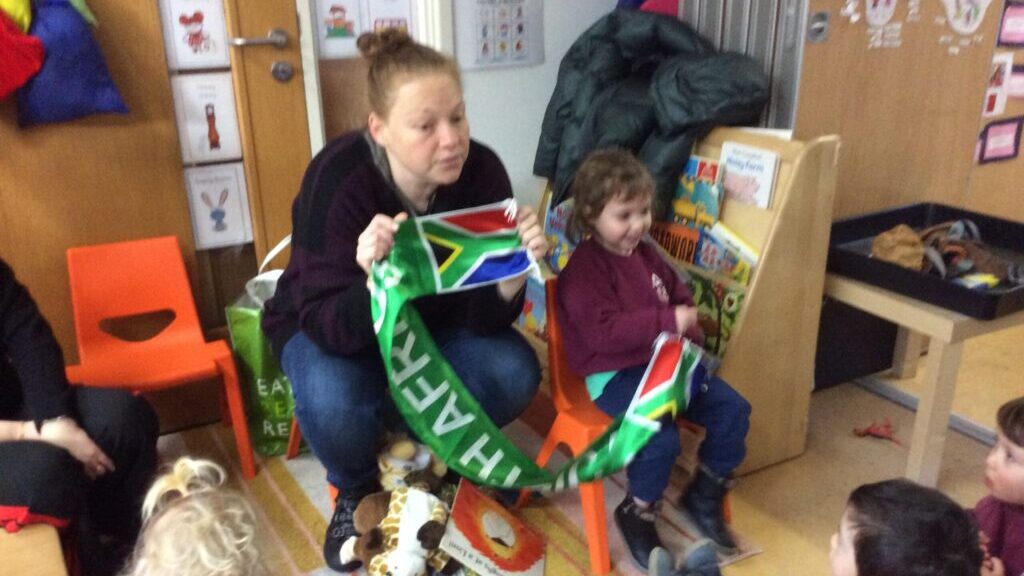We chat to outdoor play expert Claire from Creative Play, who shares how imaginative play can support early years development…
Positive parent partnerships
Building relationships with parents is a key part of the Early Years Foundation Stage. Charlotte Goddard asked two Outstanding-rated nurseries to share their best practice.

Some nurseries are finding the cost of living crisis is making it more difficult to engage with parents who may need to work longer hours to survive. “We always try to include parents in the setting, but it is increasingly difficult as they become more time-poor,” says Matthew Byrne, director of Crafty Wizards Pre-schools, a group of five settings in South London. “The cost of living crisis has had an impact on parents’ working patterns; it seems harder to try to get parents to find time to come in.”
A recent survey carried out by Connect Childcare found 67% of nursery managers and owners felt they could do better in communicating with parents and carers. It is essential that settings continue to build strong relationships with parents and carers, to support the development and the wellbeing of children in their care.
“We always say to parents that every child has their own learning journey, and you are part of that journey,” says Tor Alter, headteacher at Alyth Kindergarten in Northwest London, which is part of the North Western Reform Synagogue.
When there is a relationship of trust, parents are more likely to tell nursery practitioners about domestic issues that might affect the child, and practitioners will be better equipped to have difficult conversations about potential concerns. “We can have these open conversations when challenging situations arise, having built a relationship where we feel can talk about where their child is at and how we can support them,” says Byrne.

Home visits
At Alyth Kindergarten, parents receive a home visit from the headteacher before their children start. “I tend to do a maximum of three in one day as otherwise it is too much,” says Alter. Visits take between 45 minutes and an hour. Parents are given information about the child’s key worker, including a photograph and their hobbies and interests, and Alter is able to find out about a child’s preferences and family background. “If they are really into Peppa Pig for example, I know the Peppa Pigs will be out on that first day to help that child settle,” she says.
Flexibility
It’s important for parents to feel they can contact the nursery with any concerns. “We have an open door policy, parents can come and have conversations with a key person or manager at any time,” says Crafty Wizards’ Byrne. Alyth Kindergarten gives parents an A4 sheet detailing the different ways they can communicate, including face-to-face meetings, the headteacher’s email address, the telephone, and the Tapestry app. The sheet is also pinned up in the setting.
Practical support
Some nurseries run food banks, or collect second-hand clothes and toys to pass on to parents who need it, while others might have a noticeboard with details of local support services. “We have a lot of Israelis who’ve recently come from abroad,” says Alter. “We will tell them where to get their hair cut, where their local GP is, just so they feel part of the community.”
Family days
Some settings, such as Alyth, hold Stay and Play sessions for parents and children before children start at the nursery. “It’s a chance for parents and children to meet the teachers and be in the setting,” says Alter. Activity days are another way to get parents involved. Crafty Wizards holds family open days with themes such as Superhero Day, Disco Day and Crafty Cakes. “We encourage parents and carers to have conversations with practitioners about exciting ways to promote learning with their children,” says Byrne.
Alyth invites parents to get involved in ceremonies including the Friday Kabbalat Shabbat. Parents, carers and wider family members are also invited in on a weekly basis to bake challah bread and do woodwork with the children, and are encouraged to come and share their expertise and professions during circle time.
Grandparents take part in intergenerational activities with the children during a Special Person Day once a year. “When they have done the activities we invite the parents in, so there is a three-generation ceremony,” says Alter.

Home learning
Key workers at Crafty Wizards have a range of home learning sacks which are made available to parents. “Some are number-related, some offer support to children with English as an additional language, some are based around topics,” says Byrne. Sacks include ‘small talk cards’ detailing activities which promote interaction but don’t involve special resources, such as Peekaboo.
“We include a range of objects to make it exciting – activity cards, books that link to the theme, practical tips, toys,” says Byrne. Crafty Wizards also sends home the ‘chatterbox’. “It is just an empty box with a fancy label, and instructions to parents to fill it with something that is special to that child, to promote conversation” says Byrne. “Then the key person can use it to show friends and engage in talk and questioning.”
English as an additional language
Building a relationship with parents of children who have English as an additional language can be more challenging, but is just as important. “We might use more gestures, visual prompts, and Google translate,” says Byrne. “Parents might have someone else who can speak for them, or they might communicate better in writing. If language difficulties were really impacting on our ability to build relationships, we would contact our local authority to see if we could access the services of a translator.”
Digital communications
Settings are increasingly using a range of different digital channels to communicate with parents. Crafty Wizards has a parent Facebook group, and also uses the ParentZone app to share observations and assessments.
Alyth Kindergarden uses Tapestry to send photos and videos to parents, and encourages parents to send pictures back. “If they have had a new baby, or have been to a museum at the weekend, they send photos to us and we print them off and put them up in the classroom, or ask the children to talk about them to their friends,” says Alter. She also posts pictures of the activities set up in the classroom on a WhatsApp group so parents can talk to their children about what they have enjoyed.
The nursery has concerts five times a year, and cameras to allow parents and wider family to watch over Zoom if they can’t make it. A weekly newsletter includes an article on child development – topics have included immunisations, encouraging children to read, and dealing with picky eaters.
Suggestion box
At Alyth, parents can put comments, which can be anonymous if preferred, into a suggestion box which sits outside the door of the kindergarten. “We have had suggestions like ‘can you offer more fruit in the morning for breakfast club?’” says Alter. “We really do listen to our parents; it is important they are happy, so if we can change something, we will.
Latest Features
The roll-out of new innovations doesn't always go to plan. Ben Case, education advisor at childhood education platform Tapestry, sets…
We discover how RafaKidz Medmenham transformed its outdoor space




